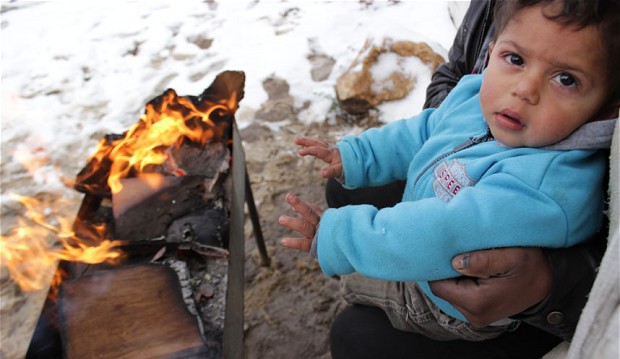
Harsh winter conditions in the Middle East have made life a misery for millions of displaced people, and children suffering through Syria’s nearly four-year conflict are among the hardest hit, according to a new report from the U.N. Children’s Fund (UNICEF), which warns that millions of vulnerable Syrian children are at risk of illness and death from what’s shaping up to be the worst winter since the conflict began.
At least 7 million Syrian children have fled to refugee camps or have been internally displaced and are in desperate need of assistance, says UNICEF. Many families that once lived in secure shelters, owned warm clothing and were able to afford heat at the outset of the war, now don’t have access to any of those basic necessities.
In Lebanon alone, nearly 190,000 Syrians have sought refuge, but many don’t have any protection from snow and gusty winds beyond their meager tents. Often fleeing Syria destitute, with nothing more than the clothes on their backs, they have made homes out of whatever they can find including plastic bags, wood panels or potato sacks.
Umm Khalil, a mother of four who declined to give her real name, shares a flimsy tent with her family in Zahle, Lebanon. The concerned mother has few possessions left and doesn’t know how they’ll survive the frigid winter, The Washington Post reported.
“In summertime, we manage somehow. But in winter it is so hard,” she told The Post. “Sometimes we can’t help thinking we would prefer to meet our deaths in Syria than go through this.”

Many Syrian refugees live in tents that offer very little protection from the harsh winter conditions, which are the worst in several years.
UNICEF has confirmed that three refugees have already died in Lebanon as a result of the harsh winter conditions. That included a father and son who tried crossing the border from Syria into Chebaa.
These tragedies are becoming more frequent as temperatures plummet in Syria to as low as minus 11 degrees, leaving despaired families with no means to protect their children. Most don’t have the funds to buy warm clothes, stoves and blankets, and rising fuel costs have only exacerbated the situation. According to UNICEF, fuel prices have risen 350 percent since the start of the conflict.
The start of winter coincides with a polio vaccination campaign that seeks to vaccinate 750,000 children in Lebanon after an outbreak of the disease was confirmed in eastern Syria in October. As melting snow and ice wreak havoc on the muddy terrain, the risk of polio — which spreads through water and sewage — is likely to spike.
Children are also at a higher risk of developing respiratory infections and getting exposed to indoor pollution, as impoverished families rely on such unconventional heating methods as burning plastics to keep their shelter warm.

UNICEF is expediting delivery of blankets and winter clothes to Syrian refugees, but it warns that relief efforts are not keeping up with the growing humanitarian crisis.
UNICEF has stepped up its aid response, delivering warm clothing, blankets, heating supplies, cash and vouchers to more than 900,000 children in Syria, Iraq, Lebanon, Jordan and Turkey. Still, the organization fears that its efforts can’t possibly address the scope of the crisis.
“While important, these achievements pale in comparison to the numbers of children and families whose lives are being devastated every day this terrible conflict drags on,” Maria Calivis, UNICEF regional director for the Middle East and North Africa, said in a statement.
